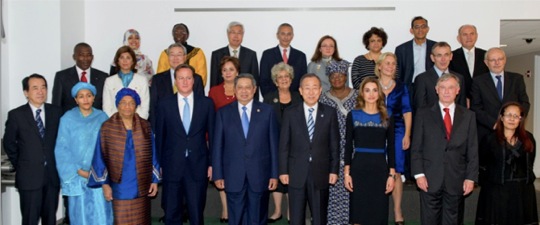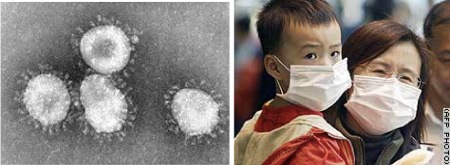March column
Claudio Schuftan

Bangkok. Here is the skyline of the centre of the modern city. All three of our meetings were held in the tall, slender, pointed highrise on the right, above
Bangkok. I report on three back-to-back meetings in which I participated, here in the capital city of Thailand. First was a two-day meeting of the People's Health Movement steering council. Then was a one-day Asian consultation on the role of health in the post 2015 development agenda. The week ended with a four-day meeting on uniting world opinion and action on the crisis of rapidly spreading epidemics. Towards the end of the week David Sanders and I, both Association members, had a dialogue with David Nabarro, co-ordinator of the global Scaling Up Nutrition (SUN).
The intensity of the schedule meant that I had all my meals in the hotel or conference centre and gave myself just one afternoon to do some sightseeing. So much for the glamour of professional travel, I thought. I give my apologies to beautiful and exotic Bangkok.
People's Health Movement
Getting ready for 2015 +

Bangkok meeting #1. The People's Health Movement steering council session. We focused on key global health challenges to be faced after 2015
This was a historically important meeting for us; the first after our third People's Health Movement assembly in Cape Town last July. It was the first after we incorporated groups of young people and also paid special attention to gender and regional balance, it set in motion activities considered in our Cape Town Call to Action of last July (www.phmovement.org), and it elected our coordinating committee within the steering council.
We approved the People's Health Movement position paper on the key challenges in health in the post 2015 era, now submitted to the World Health Organization and available here); a strengthened communications strategy; plans for our next Global Health Watch, our flagship biannual publication.
We also made a renewed commitment to our WHO Watch in which we have young observers in Geneva to monitor WHO's Executive Board meetings every January and its World Health Assembly every month of May. The watchers review all items on the agenda and all proposed resolutions, and give a civil society perspective on them, distributed to the 170 plus national delegations attending the World Health Assembly. Once again we demonstrated our unity of objectives contained in our People's Charter for Health, and reaffirmed our commitment to become and remain the number one social movement in health, already representing the aspirations of a vast grassroots, professional and academic constituency in over 75 countries.
Development in 2015 +
Some pep in the proceedings

Bangkok meeting #2. No, this wasn't us. This is the High Level Panel on
development after 2015 appointed by UN secretary general Ban Ki-moon
My next meeting was connected with the United Nations Asian Consultation on the role of health in the post 2015 development agenda, facilitated by the People's Health Movement. Above you see the official bigshots assembled by UN secretary general Ban Ki-moon (more or less centre in the front row in the picture above, with UK prime minister David Cameron two to his right). Our intention was to put a little pepper into the proceedings, as witness the HIV Positive demonstration against the profiteering of the pharmaceutical industry in the picture below.

Bangkok meeting #2. No, this wasn't us. Here is one of the vitally affected
groups who you don't see speaking at the UN or World Economic Forum
The mandate we received from the UN, through WHO, who sponsored the consultation, was to make a critical review of the achievements and shortcomings of the Millennium Development Goals in Asian countries. Also, the brief was to identify the vision civil society in these countries had for the role of health in the post-2015 development era. The People's Health Movement sent around invitations to submit papers on these topics to organizations in around a dozen countries. Positions from Thailand, India, and the Philippines, were presented and also some from out-of-Asia regions present – Palestine, Ghana and a Latin American overview. The meeting was attended by around 50 people including representatives from WHO, the Rockefeller Foundation, the Japanese Development Agency, Asian and global civil society organisations, and assorted academics.
The session began with a presentation by the People's Health Movement of how we judge the Millennium Development Goals for 2000-2015 have performed so far, and what this suggests for the 2015-2025 decade. This derives from our document already linked above and now again here. The summary report of the consultation, with the Asian country reports as annexes, has now been submitted to WHO for reviews and forwarding to the high level panel appointed by the UN Secretary General Ban Ki-moon, whose responsibility it is to clinch the post-2015 development agenda.
Infection
Need to know the causes of the causes

Bangkok meeting #3. No, this isn't us. We learned about diseases like SARS moving from animals to humans, and about antibiotic resistance
Then the week finished with the four days of the conference on 'A world united against infectious diseases'. About a thousand people attended. Don't you love these bullish conference titles! The organisation was flawless and the hospitality was up to top Thai standards. I learned a lot, having been ignorant of all the new infections that can jump from animals to humans with the risk of triggering epidemics and even pandemics.
But the overwhelming biomedical focus was striking. We from the People's Health Movement were vocal in many of the session. We attended all the plenaries. I attended a parallel session on the 'One Health' paradigm and food security. Its focus was on the supply and safety of foods of animal origin, despite food security being mostly an issue of demand. I also attended a session on the issue of antibiotic resistance and was impressed to know that in the US, 90 per cent of all antibiotics used are administered to animals! No wonder multiple-resistant infections are spreading.
Scaling Up Nutrition
Where the SUN don't shine

David Nabarro (above) once SARS Czar, has held many various UN posts reporting to UN secretary general. His task now is to make SUN shine
David Nabarro, the Scaling Up Nutrition (SUN) initiative coordinator, was in one of the opening panels of the international conference. His intervention related to the time when he was WHO SARS Czar. During discussion time, David Sanders and I spoke from the floor and asked him pointed questions. The next day he chaired the panel session on pandemic diseases and food security. Again, both of us intervened from the floor. That evening, we found emails from him asking us if we would meet with him.
We did so the next day. We told him that we now have a group that, since late January, has again taken up the discussions on SUN and the UN Standing Committee of Nutrition. On SUN, we said that our concerns are basically the same as those he has received from the International Baby Food Action Network (to which he has replied). These include:
- Conflict of interest. Corporations and industry and organisations backed by industry are active on the SUN board.
- Dislocation from the UN process. SUN bypasses the sovereign UN system's role in food and nutrition governance.
- Avoidance of frontally addressing structural determinants. SUN ignores the underlying and basic causes of malnutrition.
- Lack of an appropriate main focus. SUN pays little or no attention to the concept of the human right to nutrition.
- Stress on technical interventions imposed from abroad. Little scope for countries to determine their own national priorities and plans.
- Connection with big business, like the G8 Coalition on Food Security for Africa, that may promote agribusiness and land-grabbing.
- Partnerships with transnational corporations that are used to whitewash their reputations in their public relations campaigns.
- Stress on medical-type approaches. High percentage of SUN's budget is for treatment, in part for ready-to-use therapeutic foods.
- In their governance, preference given organisations that depend on donor funding over popular movements that are critical of SUN.
We also brought up the issue of the UN Standing Committee on Nutrition, which seems to be not standing but prostrate. David Nabarro agreed that resuscitation was needed. We learned later that the current skeleton SCN has been funded for another year or two by German and Dutch government agencies. Not by UN agencies. Odd.
David Nabarro gave us a history of his personal involvement with SUN since 2009. He said he accepted the job of SUN co-ordinator provided he could counter the overwhelming technical approach of the early proposals by the World Bank for SUN. He said that he has always been 'a social determinants man'. The job has not been easy, but he felt progress has been made. He insisted that human rights and breastfeeding issues have always been important to him.
In response to our concern that there is undue pressure from donor countries and from industry, he said that actually 70 per cent of the budget of SUN will be for preventive interventions. He said that, at a global level, SUN has no role in the promotion of ready-to-use therapeutic foods. We emphasised that the SUN decision-making process needed to include public interest civil society organisations and social movements, and that so-called non-government organisations closely linked with or mainly funded by industry should not be admitted as if they were independent.
We finally added that our network will be keeping a critical eye on the SUN's beams. He thanked us and promised to stay in touch.
cschuftan@phmovement.org
www.phmovement.org
www.humaninfo.org/aviva
Acknowledgement and request
Conflicting or competing interests: I am a member of the Council of the People's Health Movement. I do not regard this as a competing interest. This commentary has been reviewed by Geoffrey Cannon.
Readers may make use of the material in this commentary if acknowledgement is given to the Association, and WN is cited. Please cite as: Schuftan C. People's Health Movement. Getting ready for 2015+, [Column]. Website of the World Public Health Nutrition Association, March 2013. Obtainable at www.wphna.org
All contributions to this website are the responsibility of their authors. They should not be taken to be the view or policy of the World Public Health Nutrition Association (the Association) or of any of its affiliated or associated bodies, unless this is explicitly stated.






